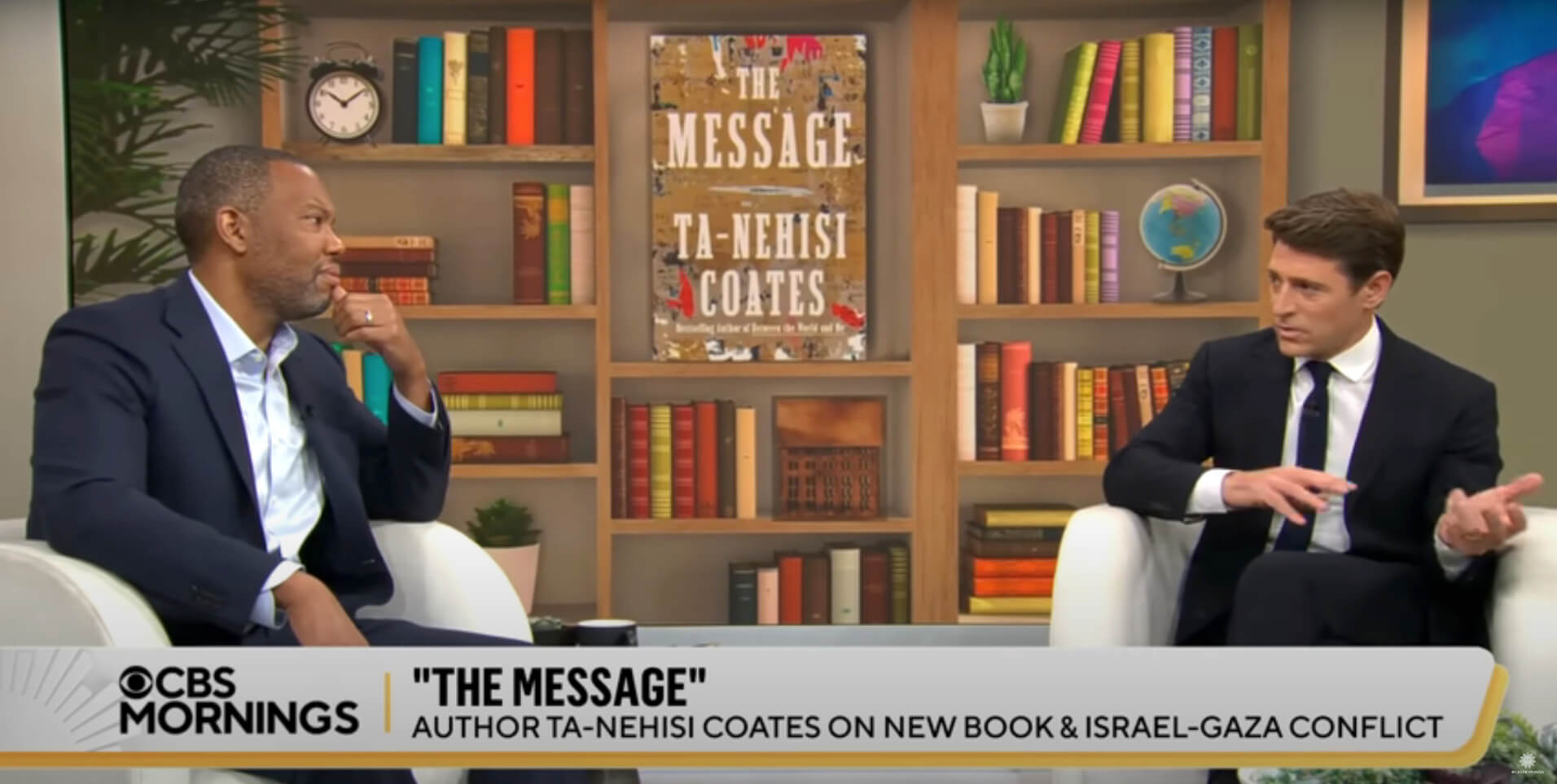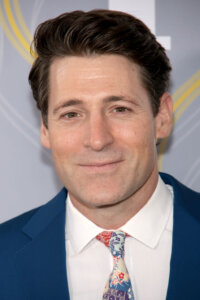Was the viral Ta-Nehisi Coates interview a hit piece or fair play? A journalism ethics expert weighs in.
After Tony Dokoupil’s questions on CBS Mornings faced criticism, the network said it fell short of editorial standards

Ta-Nehisi Coates, left, and Tony Dokoupil on CBS Mornings. Image by screenshot/CBS
In his new book, The Message, Ta-Nehisi Coates, who is perhaps the foremost writer on racism in America today, compares Israel’s treatment of Palestinians to the Jim Crow South. Early reviews have noted the book does not provide context on the Israeli-Palestinian conflict, which the author has said was intentional.
On Sept. 30, CBS Mornings’ Tony Dokoupil repeatedly challenged Coates to defend that choice. The segment was tense, but cordial, and the six-minute clip racked up millions of views. But Dokoupil, who is Jewish, has since come under fire for his tactics, and on Monday CBS News executives told staff in a weekly call the interview fell short of editorial standards for impartiality.
That seems to be a matter of some dispute. After the segment aired, Dokoupil drew praise in some corners for asking tough questions that elicited meaningful answers. The Washington Post called the interview “substantive.”
But others saw Dokoupil’s questions as biased and unnecessarily abrasive. They noted he didn’t let Gayle King, his co-host and a Black woman, get a question in. A few even called the interview racist.
Dokoupil — who has written about his conversion and whose ex-wife lives in Israel with their two children — has remained mum on the interview since it aired. But during the CBS News call, at least one prominent journalist took the network heads to task for throwing Dokoupil under the bus.
“When someone comes on our air with a one-sided account of a very complex situation, as Coates himself acknowledges that he has, it’s my understanding that as journalists we are obligated to challenge that worldview,” Jan Crawford, CBS News’ chief legal correspondent, reportedly said in the call. “And, to me, that is what Tony did.”
Claudia Milne, CBS News’ senior vice president for standards and practices, did not respond to the Forward’s request for comment.
So was the CBS Mornings segment a hatchet job, or fair play? I reached out to Kelly McBride, head of Poynter’s Craig Newmark Center for Ethics and Leadership, for her thoughts. Previously a religion and politics reporter, McBride has written a number of articles for Poynter related to the Israel-Hamas war since Oct. 7, including an explainer on the Israeli-Palestinian conflict and a piece about how to cover pro-Palestinian protests.
McBride, who said she had already watched the interview multiple times, said that while Dokoupil had helped deliver an unusually deep conversation for morning television, he had also asked “gotcha” questions that would turn off some viewers.
“He could have simplified his questions and had a better discussion — a more informative discussion,” McBride said. “And that probably would have made the conversation more accessible to a wider group of people.”
A matter of framing
Dokoupil was not the only reader of The Message to remark that it left out context about Israel. New York Magazine, in a recent profile of the author, pointed out that the book ignored Palestinian terrorism, the Intifadas, and Oct. 7, and that it did not take up the broader question of Jewish vulnerability at all.
But Dokoupil, who is a former NBC News and MSNBC correspondent, never directly asked Coates why not. And he opened his first question with what sounded like an attack: He told the author that his essay on Israel “would not be out of place in the backpack of an extremist.”

Noting the lack of context about the conflict, he listed a few things Coates had excluded — “the cafe bombings, the bus bombings, the little kids blown to bits.”
Dokoupil had seemingly set up a natural question: Why didn’t you include more of Israel’s perspective?
But he asked something else: “Is it because you don’t think that Israel, in any condition, has a right to exist?”
McBride thought the natural question was the superior one. “Instead, he was guilty of a performative type of question, where he has to demonstrate his vast amount of knowledge and also his advocacy for his position,” she said.
And while layering historical context into the question was the right choice, she said how Dokoupil went about it seemed designed to put any interview subject on the defensive.
“He essentially called Ta-Nehisi Coates an extremist” — a word McBride said might strike some as racist when applied to a Black intellectual — “and that’s never a great way to start a conversation where you genuinely want to engage.”
‘The existence of a Jewish state’
After pressing Coates for an answer on Israel’s right to exist, Dokoupil tried a different approach: “What is it that so particularly offends you about the existence of a Jewish state, that is a Jewish safe place, and not any of the other states out there?”
Some viewers said the question was inappropriately suggesting Coates was antisemitic. On a more basic level, it had a flaw familiar to fans of courtroom dramas — assuming facts not in evidence.
“It presumes the Jewish nature of Israel is the cause of the offense, and I don’t think that was fair,” said McBride. “You could ask, ‘What is it about Israel that offends you?’ As opposed to throwing Judaism into that conversation.”
If Coates took umbrage at Dokoupil’s questions, he didn’t betray it in the interview. And Dokoupil’s dogged questioning about context ultimately summoned a deeper explanation from the author — in which Coates compared his abhorrence of Israeli policy to his feelings about the death penalty.
“I am against a state that discriminates against people on the basis of ethnicity,” Coates said. “I’m against that. There is nothing the Palestinians could do that would make that OK for me.”
Justifying the means?
McBride said she thought that in spite of the questions, Coates “knocked it out of the park” in the interview. “It really was one of the most interesting conversations I’ve seen on morning television,” she said.
Clearly, the CBS Mornings piece was a compelling watch. A clip of the segment has 27 million impressions on X since its posting last week, according to the site’s metrics. So I asked McBride whether Dokoupil’s tactics might be justified in retrospect, notwithstanding the internal firestorm at CBS.
After all, other recent Coates interviews, including a 21-minute appearance on The Daily Show with Jon Stewart, have been longer, extracted less from the author and generated less conversation.
The short answer was no. “You would have gotten better results if you had been better at the craft,” she said.
“The greatest common good is what we’re after in journalism,” McBride said. “So with an interview like that, you want the greatest number of people to walk away from that conversation feeling enlightened.” While Dokoupil’s approach reflected the perspective of a staunch supporter of Israel, she said, “everybody else was left out of that conversation because of the way he framed his questions.”













